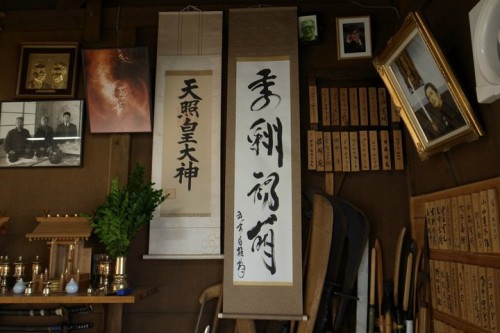If you train in the budo of the Bujinkan Dojo, or any other art with strong roots in Japanese tradition, then it won’t be long until you come across your first yojijukugo (四字熟語). Usually found painted on a hanging scroll in a dojo or tea room, these idiomatic expressions use four kanji grouped together to express ideas, maxims and slogans in a format that’s easy to remember and which has a literary quality to it.
In the Bujinkan, there are more than a few of these, most notably phrases like banpen fugyo, bufu ikkan or ninpo ikkan – slogan-like phrases used to concisely sum up an important idea or quality to be admired in the pursuit of ability in budo.
This literary form is extremely old in Japan, stemming from Chinese literature imported into Japan when it was already very old in China. In Japan, they are most closely associated with the practice of the tea ceremony but they are also to be found as philosophical tools in other traditional arts as well as handy slogans that can be used in every day speech. The total number of these expressions that exist is enormous - some estimates put it at over 10,000 - and there are plenty of website that list them that can make for an interesting browse if you’re interested.
From the point of view of the budoka, the yojijukugo that will be most of interest are naturally going to be the ones that are particularly associated with our traditions, but actually studying this art form on a more general level can be an interesting way to gain some valuable insight into Japanese culture in general. For example, Hatsumi Sensei is a well-educated and literate person with a well-known fondness for creating synonyms when he practices calligraphy. The Japanese language lends itself to this particularly well, because there are so many written characters that are pronounced the same way but have different meanings, depending on which kanji are used to write them.
For example, in the Bujinkan Dojo we have the phrase 'Kihon Happo' – a phrase usually explained as meaning fundamental eight ways/principles and referring to eight kata taken from the Gyokko Ryu of Koshijutsu. These set of eight techniques are amongst the first things a new student learns when the start training, and can be said to be the backbone of the martial art of Budo Taijutsu.
However, a kakejiku (hanging scroll) that Hatsumi Sensei painted and hung on the back wall of the old Hombu dojo uses different kanji to the normal ones. Instead of 基本八法, he has painted季翻初崩- both are pronounced Kihon Happo but have quite different meanings.
The kanji Hatsumi Sensei has used literally translate as follows: 季 is ‘ki’ of the season, 翻 is ‘hon’ meaning ‘reverse’, 初 is ‘ha’ of the first or the basics, and 崩 is ‘pou’ meaning "break down." Taken altogether, it still says kihon happo but it obviously has a different meaning to the better known fundamental eight ways.
Why did Soke do this? Probably because he wanted his students and the people training in the art he teaches to rethink their approach to the basics of his art. I won’t attempt to interpret what he means here – in a way that would steal some of the point of the exercise, as it’s up to each person to ponder the meaning – but it’s interesting to see Hatsumi Sensei take a fairly specific four character phrase – kihon happo – and change the meaning to create a new yojijukugo in the process.
He seems to be quite fond of doing this, and we can see similar examples from previous year’s themes in the idea of Rokkon Shojo, Saino konki, Kuki Taiso, Juppo Sessho and more – these are all yojijukugo, at least in the way Soke has used them.
Other yojijukugo commonly associated with kobudo include:
- 森羅万象 Shinra banshou. All the things which exist in the universe / all of creation
- 無念無想 Munen musou. To banish all other thoughts from one's mind / to be free from all distracting thoughts
- 以心伝心 Ishin denshin. Heart-to-heart communication / to have a tacit understanding
- 一期一会 Ichigo ichie. Meeting only once in a lifetime / Every encounter is treasures, because there may be no reunion.
- 花鳥風月 Kachou fugetsu. The beauties of nature such as flowers, birds, wind, and moon
- 行雲流水 Kouun ryusui. The free heart without tenacity of purpose / taking things as they are
If you'd like to read more about this idioms, this website lists an astonishing 5,800 distinct yojijukugo. Have fun!

